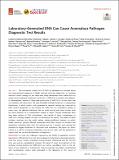Laboratory-Generated DNA Can Cause Anomalous Pathogen Diagnostic Test Results
Author(s)
Robinson-McCarthy, Lindsey R.; Mijalis, Alexander J.; Filsinger, Gabriel T.; de Puig Guixe, Helena; Donghia, Nina M.; Schaus, Thomas E.; Rasmussen, Robert A.; Ferreira, Raphael; Lunshof, Jeantine E.; Chao, George; Ter-Ovanesyan, Dmitry; Dodd, Oliver; Kuru, Erkin; Sesay, Adama M.; Rainbow, Joshua; Pawlowski, Andrew C.; Wannier, Timothy M.; Angenent-Mari, Nicolaas M.; Najjar, Devora; Yin, Peng; Ingber, Donald E.; Tam, Jenny M.; Church, George M.; ... Show more Show less
DownloadSpectrum.00313-21.pdf (979.4Kb)
Publisher with Creative Commons License
Publisher with Creative Commons License
Creative Commons Attribution
Terms of use
Metadata
Show full item recordAbstract
The coronavirus disease 2019 (COVID-19) pandemic has brought about the unprecedented expansion of highly sensitive molecular diagnostics as a primary infection control strategy. At the same time, many laboratories have shifted focus to severe acute respiratory syndrome coronavirus 2 (SARS-CoV-2) research and diagnostic development, leading to large-scale production of SARS-CoV-2 nucleic acids that can interfere with these tests. We have identified multiple instances, in independent laboratories, in which nucleic acids generated in research settings are suspected to have caused researchers to test positive for SARS-CoV-2 in surveillance testing. In some cases, the affected individuals did not work directly with these nucleic acids but were exposed via a contaminated surface or object. Though researchers have long been vigilant of DNA contaminants, the transfer of these contaminants to SARS-CoV-2 testing samples can result in anomalous test results. The impact of these incidents stretches into the public sphere, placing additional burdens on public health resources, placing affected researchers and their contacts in isolation and quarantine, removing them from the testing pool for 3 months, and carrying the potential to trigger shutdowns of classrooms and workplaces. We report our observations as a call for increased stewardship over nucleic acids with the potential to impact both the use and development of diagnostics.
Date issued
2021-09Department
Massachusetts Institute of Technology. Institute for Medical Engineering & Science; Massachusetts Institute of Technology. Department of Biological Engineering; Massachusetts Institute of Technology. Media LaboratoryJournal
Microbiology Spectrum
Publisher
American Society for Microbiology
Citation
Robinson-McCarthy, Lindsey R. et al. "Laboratory-Generated DNA Can Cause Anomalous Pathogen Diagnostic Test Results." Microbiology Spectrum 9, 2 (October 2021): e00313-21. © 2021 Robinson-McCarthy et al
Version: Final published version
ISSN
2165-0497